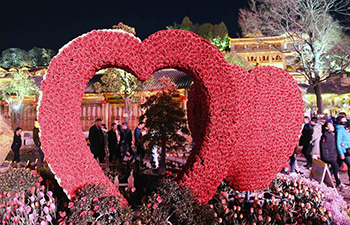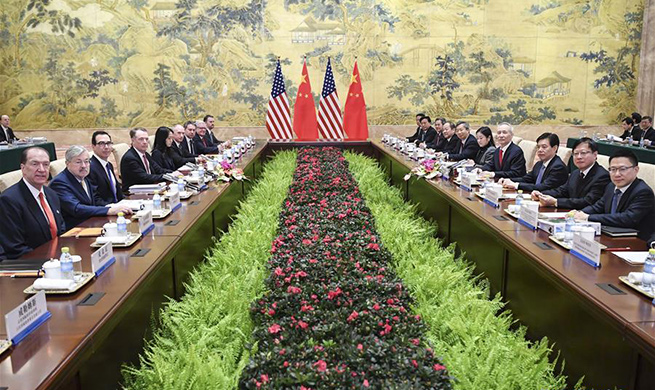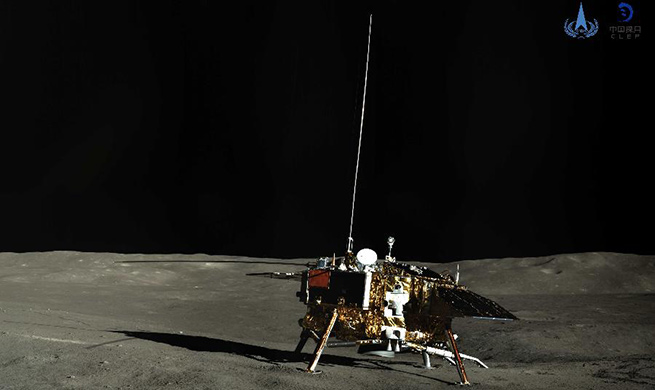by Dana Halawi
BEIRUT, Feb. 14 (Xinhua) -- While the Lebanese parliament has been busy in discussing the new cabinet policy, most analysts do not seem very optimistic about the possibility of implementing the items included in the current statement.
"Since Lebanon's independence in 1943, most ministerial statements were slightly implemented. Also, the current statement was copied from the previous ones and only few changes have been made," said political analyst Rafik Nasrallah.
Nasrallah ruled out the possibility of implementing the items that were included in the policy due to disagreements between different political parties.
For instance, opposition lawmakers held heated exchanges with Hezbollah members of the parliament on the second day of the parliamentary session. Wednesday's war of words began when Kataeb Party began to probe the question of whether the cabinet was "the government of Hezbollah," which promoted a strong intervention by Hezbollah member of the parliament Nawwaf Musawi.
Other heated exchanges took place as well among other members of the parliament in the first two cabinet sessions held on Tuesday and Wednesday to discuss the cabinet policy.
The parliament is expected to convene again to discuss the policy statement on Friday and Saturday.
The policy statement includes a detailed overview of the government's objectives and the sectors that it will focus on, including finance and economy, especially reforms recommended at CEDRE conference, the refugee issue, the electricity sector, and the participation of women in public and political life.
To gain a vote of confidence, the cabinet must secure the support of 65 members of parliament, or half of parliament's 128 members plus one.
Prime Minister Saad Hariri announced over the weekend that he believes the government will get at least 100 votes because all political parties are represented in the new cabinet.
"Political parties have agreed to give a vote of confidence to the new cabinet because they don't want to waste CEDRE funds," Nasrallah said.
Lebanon secured the loans and grants from international donors at CEDRE, an international conference in support of Lebanon development and reforms, to revamp its ailing infrastructure and bolster its economy.
But Lebanon had to form a government and show serious readiness to implement necessary economic reforms to comply for the 11 U.S. billion dollars pledged at CEDRE.
"Lebanese officials received various messages from the international community that they will risk losing CEDRE funds if they do not form a government. This is why they want to approve the ministerial statement and secure a vote of confidence for the new cabinet," Nasrallah explained.
Nasrallah said Lebanon needs an exceptional ministerial statement that is up to the level of challenges facing the country.
"They could have focused on a few points including electricity, trash crisis and public finances while drafting a quick strategy to save the country instead of copying previous statements," he said.
Political analyst Samir Atallah reiterated Nasrallah's comments by saying that Lebanon has seen the drafting of several ministerial statements with only small implementation of the items included in previous policies.
Moreover, Atallah said that the ministerial statement is not really genuine because it includes certain items that are opposed by some political parties but they should be mentioned in the policy in a bid to avoid disputes among different parties.
Atallah cited the relation with Syria as an example by saying that the statement was not clear about this issue because Future Movement headed by Hariri is against opening up to Syria.
"Even if some parties opposed the dialogue with Syria, we will see very soon that some officials will open up to Syria in a bit to solve the Syrian refugees issue and guarantee their return to their homeland," Atallah explained.
Atallah noted that Hezbollah, on the other hand, is opposed to the international tribute investigating the assassination of Former Prime Minister Rafik Hariri.
"This item still has to show in the statement to avoid disputes and disagreements between political parties," he said.
Meanwhile, Nassib Ghobril, economist and head of the economic research department at Byblos Bank, said he feels satisfied with the detailed reforms of the cabinet policy with regard to public finances and the economy.
"However, people will not restore their confidence in the government unless they see these items implemented in a serious way," Ghobril said.
Ghobril added that the new government risks losing the confidence of the international community if it fails to implement the necessary reforms.
"We need serious reforms and not just cosmetic ones in a bid to stop incurring more opportunity costs," he said.

















